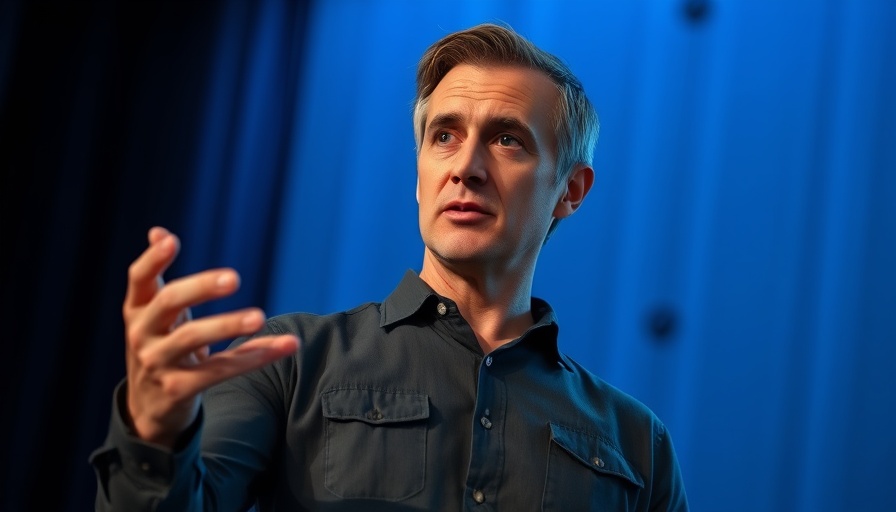
The Journey of Sam Harris: From Skeptic to Unapologetic Zionist
In a recent episode of the Unholy Podcast, Sam Harris shared his profound transformation regarding his stance toward Israel—a shift that is particularly poignant following the tragic events of October 7, 2023. Traditionally known for his staunch atheism and vocal critiques of religious sectarianism, Harris surprised many with his newfound unapologetic support for Zionism, igniting dialogues about faith, identity, and the complex realities of anti-Semitism.
In 'Why Sam Harris Changed His Mind About Israel,' the discussion dives into his profound shift in perspective, exploring key insights that sparked deeper analysis on our end.
The Shift in Perspective Post-October 7
Before the attack, Harris viewed Israel’s role with skepticism. He questioned the morality of a state organized around a religious identity, albeit recognizing the historical context of anti-Semitism. He believed that most of the world had moved past these prejudices, and Jews should not have to justify their existence. This logic, however, was tested dramatically after October 7. The subsequent widespread condemnation of Jews and the eerie resurgence of anti-Semitic sentiments forced Harris to reevaluate who would defend the Jewish people. His conclusion was clear: "Only the Jews can really be counted upon to defend themselves.”
Historical Context: Understanding Zionism
The concept of Zionism is deeply rooted in the historical context of Jewish persecution and the need for a safe haven. Harris's transition from skepticism to understanding highlights a significant narrative—one that reflects the realities faced by the Jewish community throughout history. The establishment of Israel in response to centuries of anti-Semitism serves as a reminder of why national identity can matter deeply when survival is at stake.
The Reality of Anti-Semitism Today
Harris's reflections argue that anti-Semitism is not an outdated issue but rather a pressing concern that persists in numerous societies today. The rise of social media has amplified voices that target Jews, framing them as scapegoats in political discourse. Harris’s newfound identity as an unapologetic Zionist is a desperate reaction to a world that seems to forget the lessons of history.
Supporting Israel: A Collective Responsibility
In his podcast, Harris emphasizes that it’s not enough for Jews alone to advocate for their existence. The global community must also support Israel. This point strikes a chord with believers and skeptics alike—if significant numbers of people around the world feel threatened, it is the responsibility of those in safe positions to stand in solidarity. Harris’s partnership with Artzabox exemplifies this ideology by not only promoting local artisans in Israel but also encouraging international support for Jewish communities.
Broader Implications of Harris's Shift
This discussion invites readers to consider broader discussions about identity, faith, and the historical legacies that impact our present-day lives. For many believers, Harris's transition reflects a significant reality check on how faith and identity intertwine within public and personal spheres. It encourages ongoing dialogues about how communities respond to perceived threats to their existence.
What Can We Learn From This Exchange?
The conversation between Harris and his podcast hosts is not just about Israel; it represents a greater reflection on the necessity of defending one’s beliefs and identity in an increasingly fractured world. It urges readers from all walks of life to consider the significant implications of their perspectives on faith, security, and solidarity.
Practical Insights for Faith and Community Engagement
So, how can individuals engage meaningfully in these discussions? First, understanding the historical context of issues like Zionism can foster empathy and connection. Secondly, supporting local and global businesses that promote cultural understanding, such as those featured in Artzabox, represents a way to tangibly show solidarity. Finally, being informed and willing to participate in community dialogues can help dismantle misconceptions and support initiatives that encourage peace and coexistence.
Conclusion: The Call to Action
The complex tapestry of identity, belief, and communal responsibility intersects in ways that are often challenging to navigate. While Sam Harris's journey from skeptic to a supporter of Zionism is personal, it reveals universal themes of defensiveness and the pursuit of safety. Readers are encouraged to reflect on their own positions and consider how they can contribute to fostering understanding and support for communities like Israel.
Join us in exploring these dynamics more profoundly. Consider engaging with local discussions, supporting related initiatives, or even questioning your perceptions. Every step matters in creating an inclusive environment where diverse ideas can flourish.
 Add Row
Add Row  Add
Add 








Write A Comment